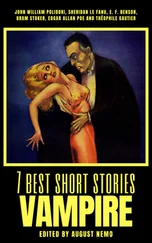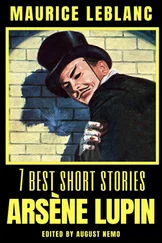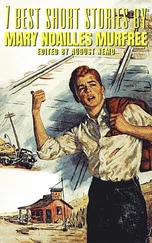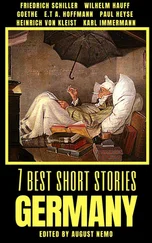"Very well. But then where is the scamp?"
"Here, between those four walls."
"Very well. Then ferret him out. We give it up. It's quite clear, that if a man were hidden within the precincts of this farm, we should have found him by now."
"I swear I'll lay hands on him, true as I stand here!" shouted Farmer Goussot. "It shall not be said that I've been robbed of six thousand francs. Yes, six thousand! There were three cows I sold; and then the wheat-crop; and then the apples. Six thousand-franc notes, which I was just going to take to the bank. Well, I swear to Heaven that the money's as good as in my pocket!"
"That's all right and I wish you luck," said the examining-magistrate, as he went away, followed by the deputy and the gendarmes.
The neighbours also walked off in a more or less facetious mood. And, by the end of the afternoon, none remained but the Goussots and the two farm-labourers.
Old Goussot at once explained his plan. By day, they were to search. At night, they were to keep an incessant watch. It would last as long as it had to. Hang it, old Trainard was a man like other men; and men have to eat and drink! Old Trainard must needs, therefore, come out of his earth to eat and drink.
"At most," said Goussot, "he can have a few crusts of bread in his pocket, or even pull up a root or two at night. But, as far as drink's concerned, no go. There's only the spring. And he'll be a clever dog if he gets near that."
He himself, that evening, took up his stand near the spring. Three hours later, his eldest son relieved him. The other brothers and the farm-hands slept in the house, each taking his turn of the watch and keeping all the lamps and candles lit, so that there might be no surprise.
So it went on for fourteen consecutive nights. And for fourteen days, while two of the men and Mother Goussot remained on guard, the five others explored the Héberville ground.
At the end of that fortnight, not a sign.
The farmer never ceased storming. He sent for a retired detective-inspector who lived in the neighbouring town. The inspector stayed with him for a whole week. He found neither old Trainard nor the least clue that could give them any hope of finding old Trainard.
"It's a bit thick!" repeated Farmer Goussot. "For he's there, the rascal! As far as being anywhere goes, he's there. So...."
Planting himself on the threshold, he railed at the enemy at the top of his voice:
"You blithering idiot, would you rather croak in your hole than fork out the money? Then croak, you pig!"
And Mother Goussot, in her turn, yelped, in her shrill voice:
"Is it prison you're afraid of? Hand over the notes and you can hook it!"
But old Trainard did not breathe a word; and the husband and wife tired their lungs in vain.
Shocking days passed. Farmer Goussot could no longer sleep, lay shivering with fever. The sons became morose and quarrelsome and never let their guns out of their hands, having no other idea but to shoot the tramp.
It was the one topic of conversation in the village; and the Goussot story, from being local at first, soon went the round of the press. Newspaper-reporters came from the assize-town, from Paris itself, and were rudely shown the door by Farmer Goussot.
"Each man his own house," he said. "You mind your business. I mind mine. It's nothing to do with any one."
"Still, Farmer Goussot...."
"Go to blazes!"
And he slammed the door in their face.
Old Trainard had now been hidden within the walls of Héberville for something like four weeks. The Goussots continued their search as doggedly and confidently as ever, but with daily decreasing hope, as though they were confronted with one of those mysterious obstacles which discourage human effort. And the idea that they would never see their money again began to take root in them.
One fine morning, at about ten o'clock, a motor-car, crossing the village square at full speed, broke down and came to a dead stop.
The driver, after a careful inspection, declared that the repairs would take some little time, whereupon the owner of the car resolved to wait at the inn and lunch. He was a gentleman on the right side of forty, with close-cropped side-whiskers and a pleasant expression of face; and he soon made himself at home with the people at the inn.
Of course, they told him the story of the Goussots. He had not heard it before, as he had been abroad; but it seemed to interest him greatly. He made them give him all the details, raised objections, discussed various theories with a number of people who were eating at the same table and ended by exclaiming:
"Nonsense! It can't be so intricate as all that. I have had some experience of this sort of thing. And, if I were on the premises...."
"That's easily arranged," said the inn-keeper. "I know Farmer Goussot.... He won't object...."
The request was soon made and granted. Old Goussot was in one of those frames of mind when we are less disposed to protest against outside interference. His wife, at any rate, was very firm:
"Let the gentleman come, if he wants to."
The gentleman paid his bill and instructed his driver to try the car on the high-road as soon as the repairs were finished:
"I shall want an hour," he said, "no more. Be ready in an hour's time."
Then he went to Farmer Goussot's.
He did not say much at the farm. Old Goussot, hoping against hope, was lavish with information, took his visitor along the walls down to the little door opening on the fields, produced the key and gave minute details of all the searches that had been made so far.
Oddly enough, the stranger, who hardly spoke, seemed not to listen either. He merely looked, with a rather vacant gaze. When they had been round the estate, old Goussot asked, anxiously:
"Well?"
"Well what?"
"Do you think you know?"
The visitor stood for a moment without answering. Then he said:
"No, nothing."
"Why, of course not!" cried the farmer, throwing up his arms. "How should you know! It's all hanky-panky. Shall I tell you what I think? Well, that old Trainard has been so jolly clever that he's lying dead in his hole ... and the bank-notes are rotting with him. Do you hear? You can take my word for it."
The gentleman said, very calmly:
"There's only one thing that interests me. The tramp, all said and done, was free at night and able to feed on what he could pick up. But how about drinking?"
"Out of the question!" shouted the farmer. "Quite out of the question! There's no water except this; and we have kept watch beside it every night."
"It's a spring. Where does it rise?"
"Here, where we stand."
"Is there enough pressure to bring it into the pool of itself?"
"Yes."
"And where does the water go when it runs out of the pool?"
"Into this pipe here, which goes under ground and carries it to the house, for use in the kitchen. So there's no way of drinking, seeing that we were there and that the spring is twenty yards from the house."
"Hasn't it rained during the last four weeks?"
"Not once: I've told you that already."
The stranger went to the spring and examined it. The trough was formed of a few boards of wood joined together just above the ground; and the water ran through it, slow and clear.
"The water's not more than a foot deep, is it?" he asked.
In order to measure it, he picked up from the grass a straw which he dipped into the pool. But, as he was stooping, he suddenly broke off and looked around him.
"Oh, how funny!" he said, bursting into a peal of laughter.
"Why, what's the matter?" spluttered old Goussot, rushing toward the pool, as though a man could have lain hidden between those narrow boards.
And Mother Goussot clasped her hands.
"What is it? Have you seen him? Where is he?"
Читать дальше

![Коллектив авторов - Best Short Stories [С англо-русским словарем]](/books/26635/kollektiv-avtorov-best-short-stories-s-anglo-thumb.webp)










